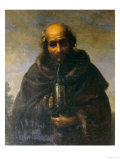|
|
|
|
|
Democritus
b. c. 460 BC; Abdera, Thrace, Greece
d. c. 370 BC
Democritus, known as the ‘Laughing Philosopher’, was one the most travelled philosophers of Ancient Greece. The son of a wealthy man, Democritus was able to visited places as distant as India and Ethiopia, living in Egypt for five years.
A careful observor of nature, Democritus is considered by many to be the “father of modern science”. He is noted for his hypothesis that “everything is composed of atoms, which are physically, but not geometrically, indivisible; that between atoms lies empty space; that atoms are indestructible; have always been, and always will be, in motion; that there are an infinite number of atoms, and kinds of atoms, which differ in shape, size, and temperature”, and works in mathematics, anthropology, biology, physics and cosmology.
Democritus quotes ~
• “Hope of ill gain is the beginning of loss.”
• “Raising children is an uncertain thing; success is reached only after a life of battle and worry.”
• “Everything existing in the universe is the fruit of chance and necessity.”
• “By desiring little, a poor man makes himself rich.”
FYI ~ Democritus is often depicted and contrasted with Heraclitus who is known as the “Weeping Philopopher”.
• Democritus: Science, The Arts, and the Care of the Soul
|
|
|
|
René Descartes
b. 3-31-1596; La Haye en Touraine (now Descartes), France
d. 2-11-1650; Stockholm, Sweden (pneumonia)
Philosopher, mathematician, and writer René Descartes, known both as the ‘Father of analytical geometry’ and the ‘Father of Modern Philosophy’, was one of the key figures in the Scientific Revolution (late Renaissance through the Age of Enlightenment).
FYI ~ At the time of his death he was employed as a tutor for Queen Christina of Sweden.
Rene Descartes quotes ~
• “I think; therefore I am.”
• “One cannot conceive anything so strange and so implausible that it has not already been said by one philosopher or another.”
• “The reading of all good books is like a conversation with the finest minds of past centuries.”
• “I am accustomed to sleep and in my dreams to imagine the same things that lunatics imagine when awake.”
|
|
|
|
John Dewey
b. 10-20-1859; Vermont
d. 6-1-1952
John Dewey, a founder of the philosophical school of Pragmatism, was an influential progressive reformer in U.S. education during the first half of the 20th century. His core concept of education was emphasizing the broadening of the intellect and the development of problem solving with critical thinking skills, rather than the memorization of lessons.
Dewey was a teacher at the University of Michigan (1884-1888 & 1889-1894), joined the faculty of the University of Chicago from 1894-1904, and from 1904 until his retirement in 1930 he was professor of philosophy at both Columbia University and Columbia University's Teachers College.
John Dewey quotes ~
• “Education, therefore, is a process of living and not a preparation for future living.”
• “Every great advance in science has issued from a new audacity of imagination.”
• John Dewey books at Amazon.com
|
|
|
|
Diogenes of Sinope
b. c. 412 BC; Greek colony of Sinope (Turkey)
d. 323 BC; Cornith
Diogenes, a founder of the philosophical school of Cynicism, had the purpose of his life to “live a life of Virtue in agreement with Nature.”
Learning to live by watching a mouse, Diogenes challenged the values and customs of society by avoiding common pleasures: he choose to be homeless and declared that he was a “cosmopolitan”, a citizen of the world, when where you were from provided status.
Diogenes invited ridecule by carrying a lighted lamp in the day time, searching for an honest man (he found only scoundrels), and challenged Plato's statement that a man was a “featherless biped” by bringing a plucked chicken to the Academy.
Diogenes quotes ~
• “I am not an Athenian or a Greek, but a citizen of the world.”
• “He has the most who is most content with the least.”
• “Wise leaders generally have wise counselors because it takes a wise person themselves to distinguish them.”
• Diogenes The Cynic: The War Against The World
FYI ~ The name Cynic derives from the Greek word kynikos = “dog-like”, and likely refers to how the people who followed the philosophy would reject conventional manners and live on the streets. The epitaph was meant as an insult.
• “It takes a clever man to turn cynic and a wise man to be clever enough not to.” ~ Fannie Hurst
• “A cynic is a man who, when he smells flowers, looks around for a coffin.” ~ H. L. Mencken
|
|
|
previous page | top | next
social studies > list notable philosophers > a | b | c | D | e | f | g | h | i-l | m | n-o-p | q-r | s | t-z < science
|
|
I have searched the web for visual, text, and manipulative curriculum support materials - teaching posters, art prints, maps, charts, calendars, books and educational toys featuring famous people, places and events - to help teachers optimize their valuable time and budget.
Browsing the subject areas at NetPosterWorks.com is a learning experience where educators can plan context rich environments while comparing prices, special discounts, framing options and shipping from educational resources.
Thank you for starting your search for inspirational, motivational, and educational posters and learning materials at NetPosterWorks.com. If you need help please contact us.
|
|
|











